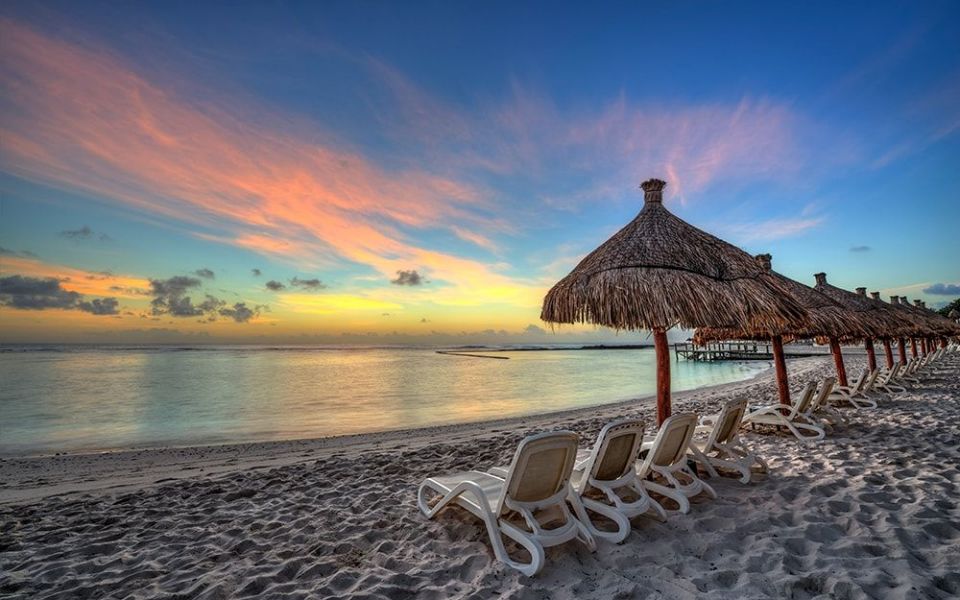With more than 35,000 Covid-19 deaths, Mexico has the fourth highest pandemic death toll in the world. The country also has the seventh-highest number of recorded cases, a whopping 324,000 at the time of writing, mainly attributed to the laissez-faire attitude of Mexican president Andrés Manuel López Obrador.
These dire figures have taken a toll on Mexico’s dynamic tourism industry, which accounts for nearly nine percent of the GDP in the entire country (but up to 90 percent of the economy in popular tourist destinations such as Cancun). Although the country never officially closed its borders to travellers, other than non-essential travel banned at the land border with the United States through August 21, it’s thought that fear of visiting during the virus will likely shrink the economy by up to 10 percent this year. “We are going through critical moments. It’s really urgent that tourism returns,” says Jesus Hernandez, a taxi driver whose fares have dropped to only a few pounds a day since the start of the virus back in April and have yet to recover.
Although infections vary widely by state, according to the Mexican health ministry the highest rates of active virus cases per capita are in Quintana Roo, which is home to the famed beaches of Cancun. Other states with large numbers of cases are Neuvo Leon on the northern border and Tabasco on the southern border, though neither are particularly tourist hot spots. Although there have been some reports that case numbers in Mexico are inaccurate, the overall consensus is that the spread of coronavirus in the country is rising.
Yet despite the statistics, Mexico is open for business. British passengers arriving via air will have their temperatures checked at all international airports before being allowed entry for tourism purposes to many of the most popular beach destinations such as Cancun, Cozumel and the Riviera Maya. But does this mean it’s safe to go? Kenny Peters, a long-time Canadian expat and bar owner in San Miguel de Allende is very nervous. “The early signs are telling me most tourists will not return back this year. The overall mood here is desperation and the uncertain future has everyone stressed.”
Since the government’s pandemic response has been viewed by many to be insufficient, plenty of the main tourist areas have implemented their own health precautions. Wearing face masks in public is now mandatory in 24 states, which include Quintana Roo and Yucatán, home to Cancun and Tulum respectively. Visitors who don’t adhere to the mandates can be fined or even arrested. Additionally, Cancun, Riviera Maya and the Yucatan Peninsula, as well as Cozumel Island, Baja California, Jalisco, Puerto Vallarta, Riviera Nayarit and San Miguel de Allende have all partnered with the World Travel and Tourism Council (WTTC) to earn the Safe Travels Stamp in the hope tourists will feel safe to return even as the pandemic grows in Latin America.
Supported by the United Nations World Tourism Organisation, the WTTC is a UK-based non-profit dedicated to ensuring the travel sector remains “seamless, secure, safe, inclusive and sustainable” in a pandemic-ruled world by implementing guidelines from the World Health Organisation and the U.S. Centers for Disease Control and Prevention.

San Miguel de Allende, a Unesco World Heritage city and one of Mexico’s most treasured Spanish-Colonial towns, has taken some of the most stringent precautions of any city in Mexico. In addition to the WTTC certification, San Miguel grants its own “Health First” certification to restaurants, bars, cultural spaces and hotels once they’ve proven sufficient sanitary protocols are in place. Additional measures include hotels operating at 40 per cent capacity, and health checkpoints along highways and in bus stations to check the temperature and take the contact information of all those entering the city.
Despite the multiple health certifications held by San Miguel de Allende, Migdalia Denike, owner of MexChic Retreats tour company, thinks it will be at least October or November before people feel safe enough to return to Mexico. For now, the country remains off the FCO list of countries that are exempt from the ban on all but essential travel.
But other local business owners are more optimistic that the tide will turn much sooner. Sandra Solis, owner of Mexicana San Miguel Hotel, feels confident. “I’m not nervous, actually I’m very happy, because the economy has to be reactivated,” she says.
Source: Telegraph UK



